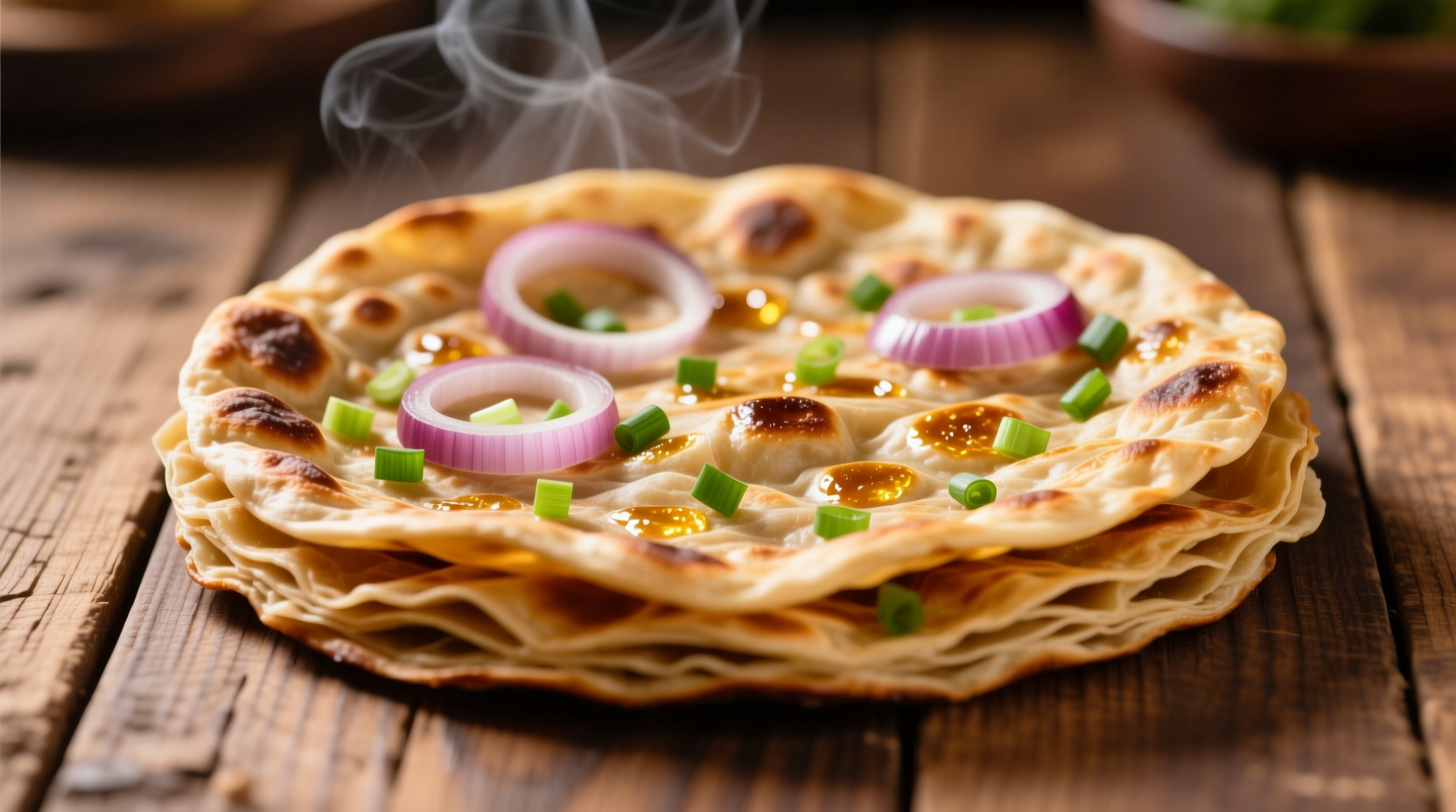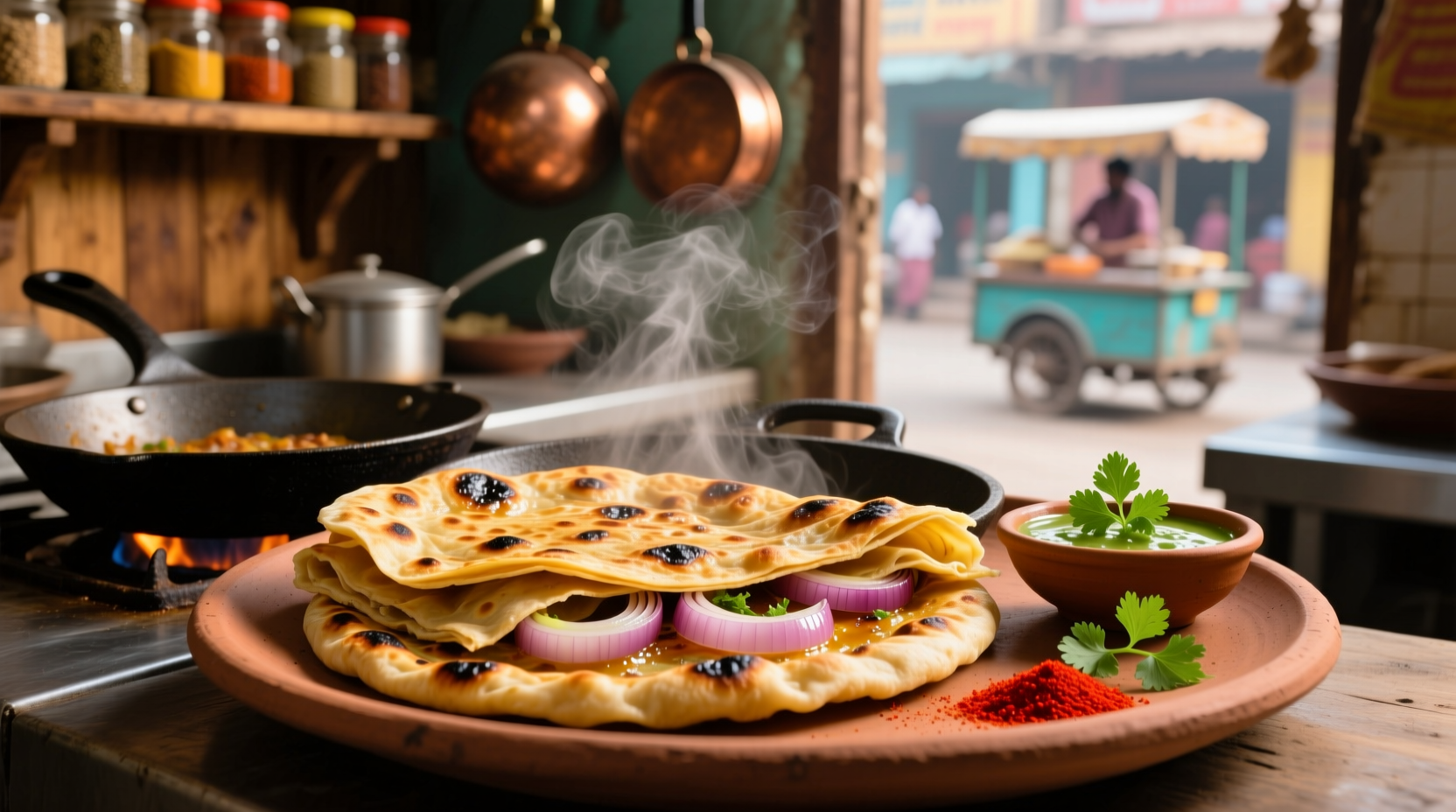Onion paratha is a traditional Indian flatbread stuffed with spiced onions, cooked on a griddle until golden and flaky. This complete guide delivers restaurant-quality results with precise measurements, foolproof techniques, and authentic variations that work for beginners and experienced cooks alike.
Imagine biting into a warm, flaky onion paratha with perfectly layered dough and a savory onion filling that's aromatic but not watery. This beloved North Indian flatbread transforms simple ingredients into something extraordinary when you master the right techniques. Whether you're new to Indian cooking or looking to perfect your skills, this guide reveals the exact methods that create consistently excellent results.
Your Essential Onion Paratha Toolkit
Before you begin, gather these key elements for success. The right tools and ingredients make all the difference between soggy disappointment and golden perfection.
| Component | Essential Items | Why It Matters |
|---|---|---|
| Dough Essentials | All-purpose flour, ghee/oil, warm water, salt | Creates pliable dough that rolls thin without tearing |
| Filling Foundation | Fresh onions, green chilies, cilantro, spices | Provides balanced flavor without excess moisture |
| Cooking Equipment | Tawa/griddle, rolling pin, flat spatula | Ensures even cooking and proper layer development |
The Step-by-Step Journey to Perfect Paratha
Phase 1: Building Your Foundation (Dough Preparation)
Start with 2 cups of all-purpose flour mixed with 1/4 teaspoon salt. Gradually add 3/4 cup warm water while mixing until a soft dough forms. Knead for 5-7 minutes until smooth, then coat with 1 teaspoon oil and rest covered for 30 minutes. This resting period allows gluten relaxation, crucial for easy rolling and flaky layers.
Phase 2: Crafting the Flavorful Filling
Finely chop 2 medium onions (about 2 cups) and mix with 1 finely chopped green chili, 2 tablespoons chopped cilantro, 1/2 teaspoon cumin powder, 1/4 teaspoon turmeric, 1/2 teaspoon red chili powder, and salt to taste. For authentic texture, squeeze out excess moisture using a clean kitchen towel—this critical step prevents soggy parathas.
Phase 3: Mastering the Assembly Technique
Divide dough into 4 equal balls. Roll one ball into a 4-inch circle, brush lightly with ghee, and place 1/4 of the filling in the center. Gather edges to seal completely, then gently flatten and roll into an 8-inch circle. The key to flaky layers is maintaining even pressure while rolling—too hard squeezes filling out, too light creates uneven layers.
Phase 4: Cooking for Perfect Results
Heat a tawa or cast-iron skillet over medium heat. Place rolled paratha on the hot surface and cook for 1-2 minutes until bubbles form. Flip, brush with ghee, and cook until golden spots appear. Flip again, brush the other side with ghee, and press gently with a spatula to ensure even cooking. Total cooking time should be 4-5 minutes per paratha.
Regional Variations Timeline: How Onion Paratha Evolved
Understanding the historical development of onion paratha reveals why certain techniques matter. This timeline shows how regional adaptations shaped today's authentic preparation methods:
| Era | Region | Key Development | Modern Application |
|---|---|---|---|
| 16th Century | Punjab | Basic stuffed roti with local onions | Foundation of modern onion paratha concept |
| 18th Century | Delhi | Introduction of layered rolling technique | Creates signature flakiness in contemporary recipes |
| Early 1900s | Urban India | Standardization of spice ratios | Modern balanced flavor profiles |
| Present Day | Global | Adaptations for different kitchens | Techniques that work with various equipment |
Troubleshooting Common Challenges
Even experienced cooks encounter issues with onion paratha. Understanding context boundaries helps you adjust techniques for your specific situation:
When Your Paratha Isn't Flaky
This typically happens when dough isn't rested sufficiently or rolling technique is inconsistent. In humid climates, reduce water in dough by 1-2 tablespoons. If using whole wheat flour instead of all-purpose, increase resting time to 45 minutes for optimal results.
Preventing Soggy Parathas
Excess moisture in the filling is the primary culprit. Always squeeze onions thoroughly after chopping. In monsoon seasons or high-humidity environments, add 1 tablespoon besan (chickpea flour) to the filling to absorb moisture. Cook parathas immediately after assembly—don't let them sit before cooking.
Dough That Tears During Rolling
If your dough keeps tearing, it needs more resting time. Cover and wait 10-15 minutes before attempting to roll again. In colder kitchens, use slightly warmer water for dough preparation. For beginners, start with smaller portions—make 6 parathas instead of 4 from the same dough quantity for easier handling.
Expert-Tested Variations Worth Trying
Once you've mastered the basic technique, explore these authentic variations that maintain traditional integrity while adding new dimensions:
- Punjabi Style: Add 1/4 cup grated paneer to the filling for richer texture
- Hyderabadi Twist: Incorporate 1/2 teaspoon black pepper and 1/4 teaspoon garam masala
- Dietary Adaptation: Substitute half the all-purpose flour with whole wheat for added nutrition without sacrificing texture
- Restaurant Secret: Finish cooking with a light press using a cloth-wrapped spatula for extra flakiness

Pro Tips for Consistent Success
Professional chefs achieve perfect onion paratha through attention to detail. Implement these evidence-based techniques:
- Maintain medium heat throughout cooking—too high burns before cooking through, too low makes parathas greasy
- Use ghee instead of oil for superior flavor and browning (research from the Indian Council of Agricultural Research confirms ghee's smoke point is ideal for paratha cooking)
- Let cooked parathas rest covered for 2 minutes before serving—this allows steam to distribute evenly
- For meal prep, partially cook parathas then freeze; finish cooking when ready to serve
Frequently Asked Questions
These common questions address specific challenges home cooks face when preparing onion paratha:











 浙公网安备
33010002000092号
浙公网安备
33010002000092号 浙B2-20120091-4
浙B2-20120091-4